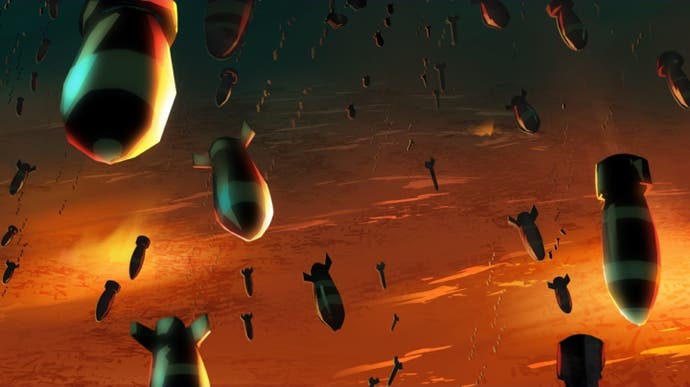Oops I let the humans die: being god of the galaxy in The Fermi Paradox is tricky
Vegan burgers or nuclear war?
Maybe I should start again? I've fudged it.
I got off to a great start though. I switched Earth to an entirely plant-based diet and felt very happy with myself, but then I sort of let a nuclear war wipe half the population out. I went a bit Thanos. And then, whoops, I thought I'd see what happened if I let a vicious group of people unleash a virus on what was left of the world, and well, total extinction apparently.
Shame! Alien contact was just around the corner. The prun horse-people, more advanced than the humans, were already on their way. But when they arrived there were no humans there to meet. How embarrassing! Mind you it's probably for the best. We'd probably have tried to put saddles on them.
Don't panic, I'm not really in charge of Earth. Can you imagine? Vegan burgers and nuclear war. No, no, I'm not in charge of Earth.
I'm actually in charge of the galaxy!
I'm some kind of benevolent god-thing in a game called The Fermi Paradox. It's my job to interfere, which I love, in the development of various civilisations around the galaxy. There are loads of them, not just humans. I've had strange worm-people; dinosaur-people; horse-people; even a kind of overgrown evil butterfly-people. They were a bad sort though so I, um, cashed them in.
And by "cashed" I mean "made extinct", but hear me out! It was a pretty bad situation. I was either going to lose 90 percent of the population and not get anything for it, or I could lose them all and get something for it. And the "something" I wanted was Synthesis.
Synthesis is gold in the game. It is the game's currency, the game's resource, and therefore the game's limiter. What you can choose for a civilisation to do at a major development point in their history depends on how much Synthesis you have. Take switching to a plant-based diet for example: it's a big move! It's a big, positive move, and these are usually the ones that require a lot of Synthesis to push through. And you don't come by a lot of Synthesis easily.
Synthesis is generated each kind of turn. An amount of time elapses (it never really says how long) between these turns, and then things that look like dandelion heads appear on your map of the galaxy (or solar system). They are Synthesis points, and when you click on one, it banks it, telling you a bit of story relevant to the star system you're near in the process. Banking Synthesis this way earns you one point per turn, so when you consider some of the biggest choices, like world peace, can cost upwards of 50 Synthesis, you begin to appreciate how pricey these decisions can be.
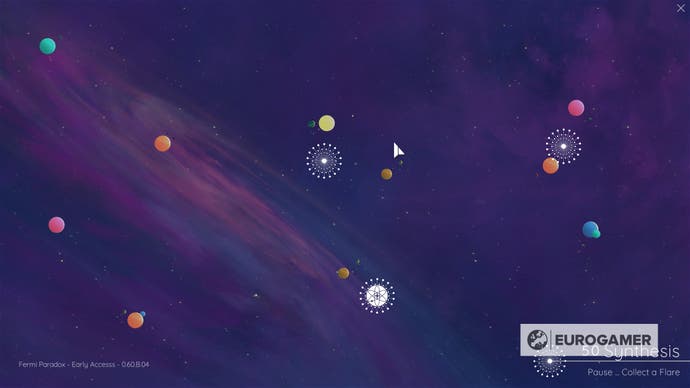
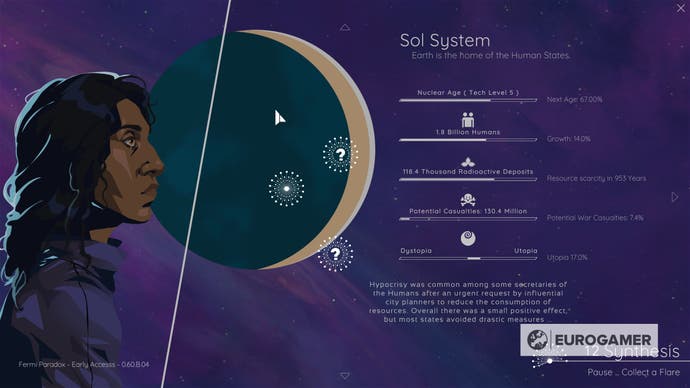
You can earn Synthesis in bulk, though. You can earn it for making horrid decisions like letting an entire civilisation die. I got 40 Synthesis for wiping out those butterfly people, and for letting the humans die - real earners! And those points I used elsewhere. Sacrificing a civilisation for another one's gain, then, is a genuine tactic in the game. Think about it like the dinosaurs being wiped out. That was the galaxy-god banking a bit of Synthesis for the humans! What? We can always build Jurassic Park down the line!
Those big-spends are the game's big moments, presented as multiple-choice dilemmas when development milestones occur. Of the three choices, usually one costs a lot of Synthesis (the best option), one costs nothing (the OK option), and one earns you a lump of Synthesis (the horrid option). These decisions also have icons next to them which represent the effect they will have on a handful of important gauges. These are technological development, population, resource scarcity, potential war casualties, and utopia/dystopia.
These gauges are always moving as time elapses, but you can bump them one way or another either during the big development moments, or turn-to-turn by picking Synthesis points with their relevant icons on (and in either positive or negative form). Pick a negative population Synthesis and maybe your civilisation develops and distributes contraception, for example.
To recap a bit: each turn you'll choose between banking a Synthesis point, or picking a Synthesis with an icon on to affect a gauge in some way (and not bank the point). Then, at various milestones (fill the technological development gauge and you will enter a new era) you'll make big decisions.
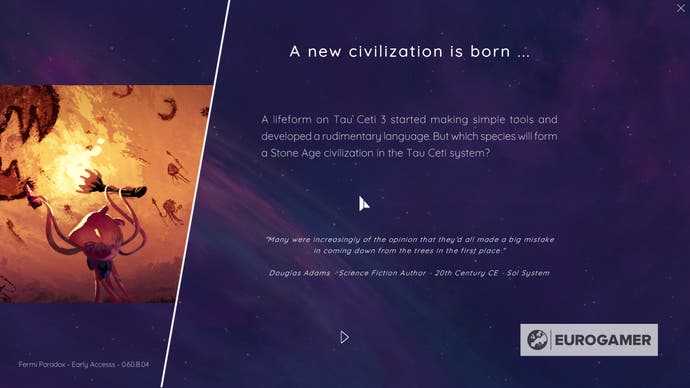
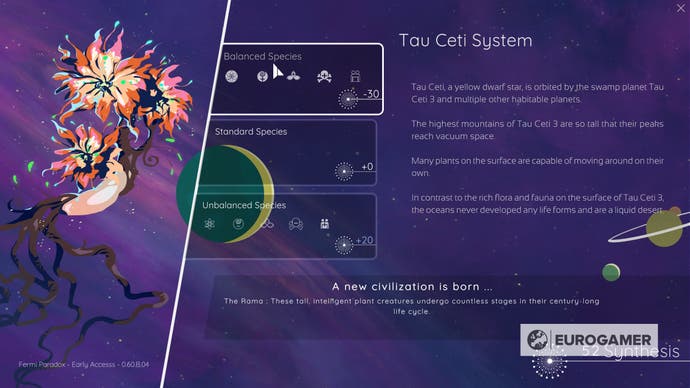
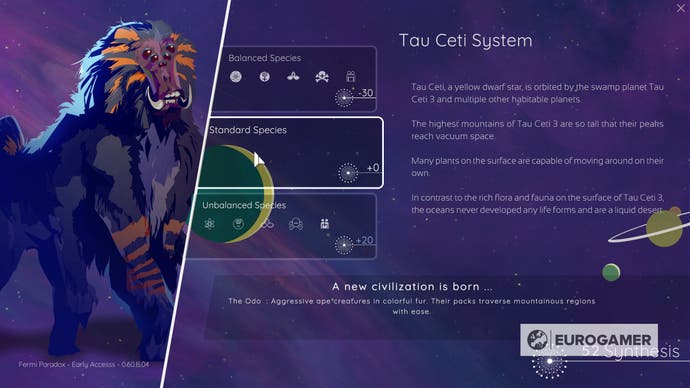
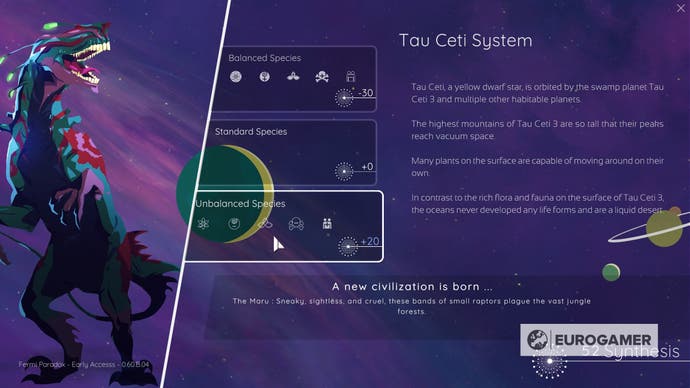
It's a fascinating idea, in no small part because many of the dilemmas you face are pertinent to the situation our own civilisation is in right now: challenges like inequality, climate change, conflict, and more. Solving them in one fell swoop is incredibly empowering. But there are further-reaching ideas, too, things like space exploration and beyond. I don't know what happens when civilisations collide, because I haven't got that far yet, but that's definitely where the game is headed. The goal is to get four separate civilisations to the Singularity Age. I haven't managed it with one.
What I hope this Early Access process brings, besides needed polish and some presentation flair (it's a bit functional, a bit still - there's not much animation - and a bit sluggish to respond) is more imagination. It's not necessarily lacking at the moment but it's limited, both in the amount of situations there are to challenge civilisations with, and the humanness of them. By that I mean the situations predominantly seem to be ones a human civilisation has faced or will face. Are they really applicable to all developed species in a galaxy? I know it's tricky to think outside of that box, given we are human, but I would love The Fermi Paradox to try.
Appropriately, though, there's time. And I am excited by the recent announcement that Vampire: The Masquerade - Bloodlines 2 writers Brian Mitsoda and Cara Ellison will join the project. They are certainly imaginative, and presumably they will help the game do exactly that: think differently. If they can, The Fermi Paradox could be great.
